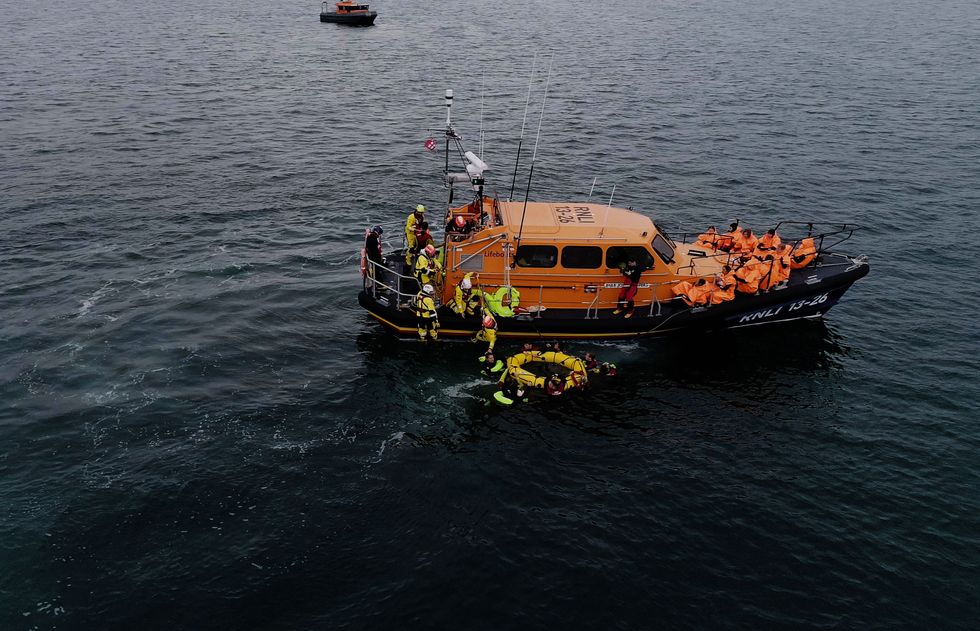RNLI tells of ‘harrowing’ migrant rescues faced by lifeboat crews

RNLI

Distressed mothers are throwing their babies at lifeboat crews called out to rescue migrants from flimsy dinghies crossing the Channel, the RNLI said.
When they go to help boats in distress at sea, the charity’s crews – made up mostly of volunteers – often arrive to sights and sounds of chaos, panic and screaming, said Simon Ling, head of lifeboats.
He said the rescues are “far from straightforward”, telling BBC Radio 4’s Today programme: “These are very flimsy, poorly constructed rubber dinghies carrying men, women and children in very difficult conditions, transiting one of the busiest shipping channels in the world.
“The first thing our crews encounter when they’re tasked is levels of distress. We often see women and children huddling in the middle of the boats, men sitting on the side, very little space between the top of the dinghy and the water, so there’s an omnipresent risk of the boat being compromised, putting everybody in the water.
“It’s very chaotic, with screaming and panic, mothers holding up babies and, in some cases, throwing the babies at our lifeboat crew to catch, such is the level of distress.
“So it’s a very complex situation for our coxswains on our crews to navigate, to try and calm the situation down, not make the situation worse and rescue as quickly and efficiently as possible.”
The “constant exposure” to such distress affects the rescuers, who are given trauma support but sometimes decide they “no longer want to volunteer”, Mr Ling said.
The charity has an attrition rate of between 5% and 10%, he added.
“Volunteering is very difficult, that’s across all of the RNLI,” he said.
“But we do recruit new volunteers. We have recruited new volunteers. Our job is then to quickly train them and equip them to do the life-saving job that they undertake.”
Mr Ling’s comments came as Government figures showed 502 migrants arrived in the UK on 12 boats after crossing the Channel on Tuesday, taking the provisional total for the year so far to 37,570.
Meanwhile, an Albanian woman suspected of helping migrant crossings take place is in custody after a raid in Banbury, Oxfordshire, on Wednesday morning.
The 31-year-old was arrested on suspicion of facilitating illegal immigration, the National Crime Agency (NCA) said.
The investigation was launched in response to intelligence that Albanian crime gangs are acting as “brokers, seeking to facilitate the illegal migration of Albanian nationals using established transportation networks”, according to the organisation’s regional head of investigations, Jacque Beer.
The RNLI published “harrowing” footage – caught on helmet cameras of Dover lifeboat crews – of a recent call-out to rescue five migrants off the south coast after they made the dangerous journey across the Channel.
Among them was a family of four – including a 14-year-old girl – believed to be from Afghanistan, the charity said.
A crew member who has taken part in such rescues said they are trained on what to do when they discover “tens of bodies floating face down in the water”, adding: “Our greatest terror is not if but when.”
Telling how dinghies are now packed full of people and the bottom of the boats are usually “swilling with a mixture of seawater, petrol and vomit”, he said the sight of the precarious conditions which could turn into tragedy at any moment “makes mouths go dry”.
“There is an unspoken fear among crew that a dinghy will split apart as people rush and clamber over its sides … Getting them on board is rarely pretty … it feels overwhelmingly chaotic.”
He said he has seen elderly women clasp their hands in prayer and look at the sky, such is their terror, and said children are kept occupied by being shown episodes of Peppa Pig on a mobile phone. Some of those rescued are suffering from cold, exhaustion or dehydration, are blind or deaf, missing limbs or are pregnant.
The publicity prompted criticism by some on Twitter, who said they will no longer give to the charity because they disagree with such rescues. Roger Lock said “defund the RNLI” and Sandi Dunn accused the charity of “supporting trafficking”.
But others defended the charity’s efforts and said the coverage prompted them to donate.
Marcus McSorley said in a post: “The role of the RNLI is to save lives and they deserve great credit for this.”
The charity said it has been “overwhelmed” by the messages of support, with many asking how they can help its work to save lives at sea.